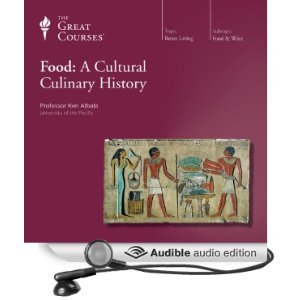5 out of 5 stars *****
What a glorious trip through history via food choices by peoples throughout the world. The presentation by Ken Albala is upbeat and pleasant. Fascinating subjects can fall flat because of dry narration but not with Food: A Cultural Culinary History.
Culture spreads easily along temperate longitudinal zones making food introduction to new territories possible. Food becomes a major reason for trade between remote places that offer certain fruits, vegetables, spices, and grains. Nobility arises as the wealthy share new foods at banquets with their affluent friends. Preparation requires employing servers and, most importantly, chefs who work hard to master the art of cooking. This becomes a status of power within the community.
Cities burgeon as recipes spread among commoners who are healthier because of the variety of food. Different parts of the world develop their own cuisine. The written word preserves the practical manner in which food is grown, harvested, prepared, and enjoyed.
Food is responsible for the temperament of the citizens of cities relying on climate, soil, and observation. Gastronomy develops out of necessity to feed populations in diverse regions. Agriculture determines whether or not a land is arable enough to sustain people before it applies its knowledge for growing plants and rearing animals.
The style of growing and preparing food, today, evolves from a country's economy since certain crops yield wealth from trade around the world. This limits the variety that the family farm yields and most people eat what is processed according to government regulations. This series of lectures ends with a look into the future that sees society pursuing healthier lifestyles. This may entail more organic foods with locally raised livestock. The informed consumer leads this trend that could very well improve a population's overall well being.

No comments:
Post a Comment